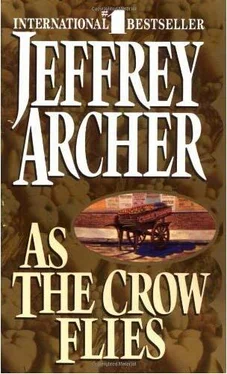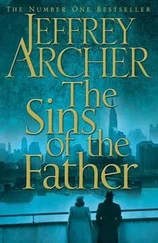Hitler marched into Poland on 1 September 1939, and Charlie realized that Ben Schubert's stories had not been exaggerated. Two days later Britain was at war.
For the first few weeks after the declaration of hostilities there was a lull, almost an anticlimax, and if it hadn't been for the increased number of men in uniforms marching up and down Chelsea Terrace and a drop in sales Charlie might have been forgiven for not realizing Britain was engaged in a war at all.
During this time only the restaurant came up for sale. Charlie offered Mr. Scallini a fair price, which he accepted without question before fleeing back to his native Florence. He was luckier than some, who were interned for no more reason than that they possessed a German or an Italian name. Charlie immediately locked up the restaurant because he wasn't sure what he could do with the premises—eating out was hardly a top priority for Londoners in 1940. Once the Scallini lease had been transferred only the antiquarian bookshop and the syndicate chaired by Mr. Wrexall still remained in other traders' hands; but the significance of Mrs. Trentham's large block of unoccupied flats became more obvious for all to see as each day went by.
On 7 September 1940 the false lull ended when the Luftwaffe carried out its mass raid on the capital. After that Londoners started to emigrate to the country in droves. Charlie still refused to budge, and even ordered that "Business as Usual" signs be placed in every one of his shop windows. In fact, the only concessions he made to Herr Hitler were to move his bedroom to the basement and have all the curtains changed to black drape.
Two months later, in the middle of the night Charlie was woken by a duly constable to be told that the first bomb had fallen on Chelsea Terrace. He ran all the way from the Little Boltons down Tregunter Road in his dressing gown and slippers to inspect the damage.
"Anyone killed?" he asked while on the move.
"Not that we know of," replied the constable, trying to keep up with him.
"Which shop did the bomb land on?"
"Can't tell you the answer to that, Mr. Trumper. All I know is that it looks as if the whole of Chelsea Terrace is on fire."
As Charlie turned the corner of Fulham Road he was confronted by bright flames and dark smoke soaring up into the sky. The bomb had landed right in the middle of Mrs. Trentham's flats, completely demolishing them, while at the same time shattering three of Charlie's shop windows and badly damaging the roof of hats and scarves.
By the time the fire brigade finally departed from the Terrace all that was left of the flats was a gray, smoldering bombed-out shell, right in the middle of the block. As the weeks passed, Charlie became only too aware of the obvious—Mrs. Trentham had no intention of doing anything about the heap of rubble that now dominated the center of Chelsea Terrace.
In May 1940 Mr. Churchill took over from Mr. Chamberlain as Prime Minister, which gave Charlie a little more confidence about the future. He even talked to Becky of joining up again.
"Have you looked at yourself in the mirror lately?" asked his wife, laughing.
"I could get fit again, I know I could," said Charlie, pulling in his stomach. "In any case they don't only need troops for the front line."
"You can do a far more worthwhile job by keeping those shops open and stocked up for the general public."
"Arnold could do that just as well as me," said Charlie. "What's more, he's fifteen years older than I am."
However, Charlie reluctantly came to the conclusion that Becky was right when Daphne came round to tell them that Percy had rejoined his old regiment. "Thank God they've told him he's too old to serve abroad this time," she confided in them. "So he's landed a desk job at the War Office."
The following afternoon, while Charlie was carrying out an inspection of repairs after another night of bombing, Tom Arnold warned him that Syd Wrexall's committee had begun to make noises about selling the remaining eleven of their shops, as well as the Musketeer itself.
"There's no hurry to do anything about them," said Charlie. "He'll be giving those shops away within a year."
"But by then Mrs. Trentham could have bought them all at a knockdown price."
"Not while there's a war on, she won't. In any case, the damned woman knows only too well that I can't do a lot while that bloody great crater remains in the middle of Chelsea Terrace."
"Oh, hell," said Tom as the Klaxon whine of the siren started up. "They must be on their way again."
"They certainly are," said Charlie, as he looked towards the sky. "You'd better get all the staff into the basement—sharpish." Charlie ran out onto the street, to find an Air Raid Patrol man cycling down the middle of the road, shouting instructions that everyone should head for the nearest Underground as quickly as possible. Tom Arnold had trained his managers to lock up the shops and have all the staff and customers safely in the basement with their torches and a small supply of food within five minutes. It always put Charlie in mind of the general strike. As they sat in the large storeroom under Number 1 waiting for the all-clear, Charlie looked around the gathering of his fellow Londoners and became aware of just how many of his best young men had already left Trumper's to join up; he was now down to fewer than two-thirds of his permanent staff, the majority of whom were women.
Some cradled young children in their arms, while others tried to sleep. Two regulars in a corner continued a game of chess as if the war were no more than an inconvenience. A couple of young girls practiced the latest dance step on the small space left unoccupied in the center of the basement while others just slept.
They could all hear the bombs falling above them, and Becky told Charlie she felt sure one had landed nearby. "On Syd Wrexall's pub, perhaps?" said Charlie, trying to hide a grin. "That'll teach him to serve short measures." The all-clear Klaxon eventually sounded, and they emerged back into an evening air filled with dust and ashes.
"You were right about Syd Wrexall's pub," said Becky, looking at the far corner of the block, but Charlie's eyes were not fixed on the Musketeer.
Becky's gaze eventually turned to where Charlie was staring. A bomb had landed right in the middle of his fruit and vegetable shop.
"The bastards," he said. "They've gone too far this time. Now I will join up."
"But what good will that do?"
"I don't know," said Charlie, "but at least I'll feel I'm involved in this war and not just sitting around watching."
"And what about the shops? Who's going to take charge of them?"
"Arnold can take care of them while I'm away."
"But what about Daniel and me? Can Tom take care of us while you're away?" she asked, her voice rising.
Charlie was silent for a moment while he considered Becky's plea. "Daniel's old enough to take care of himself, and you'll have your time fully occupied seeing that Trumper's keeps its head above water. So don't say another word, Becky, because I've made up my mind."
After that nothing his wife could say or do would dissuade Charlie from signing up. To her surprise the Fusiliers were only too happy to accept their old sergeant back in the ranks, and immediately sent him off to a training camp near Cardiff.
With Tom Arnold looking anxiously on, Charlie kissed his wife and hugged his son, then shook hands with his managing director before waving goodbye to all three of them.
As he traveled down to Cardiff in a train full of fresh-faced, eager youths not much older than Daniel—most of whom insisted on calling him "sir"—Charlie felt like an old man. A battered truck met the new recruits at the station and delivered them safely into barracks.
"Nice to have you back, Trumper," said a voice, as he stepped onto the parade ground for the first time in more than twenty years.
Читать дальше












